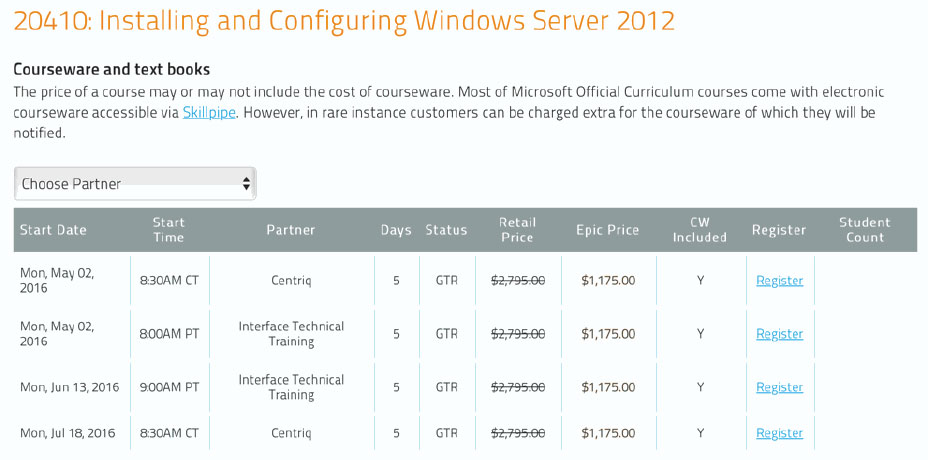AZ-800T00: Administering Windows Server Hybrid Core Infrastructure
About this Course
This course teaches IT Professionals how to manage core Windows Server workloads and services using on-premises, hybrid, and cloud technologies. The course teaches IT Professionals how to implement and manage on-premises and hybrid solutions such as identity, management, compute, networking, and storage in a Windows Server hybrid environment.
Audience Profile
This four-day course is intended for Windows Server Hybrid Administrators who have experience working with Windows Server and want to extend the capabilities of their on-premises environments by combining on-premises and hybrid technologies. Windows Server Hybrid Administrators implement and manage on-premises and hybrid solutions such as identity, management, compute, networking, and storage in a Windows Server hybrid environment.
At Course Completion
After completing this course, students will be able to:
- Use administrative techniques and tools in Windows Server.
- Identify tools used to implement hybrid solutions, including Windows Admin Center and PowerShell.
- Implement identity services in Windows Server.
- Implement identity in hybrid scenarios, including Azure AD DS on Azure IaaS and managed AD DS.
- Integrate Azure AD DS with Azure AD.
- Manage network infrastructure services.
- Deploy Azure VMs running Windows Server, and configure networking and storage.
- Administer and manage Windows Server IaaS Virtual Machine remotely.
- Manage and maintain Azure VMs running Windows Server.
- Configure file servers and storage.
- Implement File Services in hybrid scenarios, using Azure Files and Azure File Sync.
Outline
MODULE 1: IDENTITY SERVICES IN WINDOWS SERVER
Introduction to AD DS
Manage AD DS domain controllers and FSMO roles
Implement Group Policy Objects
Manage advanced features of AD DS
MODULE 2: IMPLEMENTING IDENTITY IN HYBRID SCENARIOS
Implement hybrid identity with Windows Server
Deploy and manage Azure IaaS Active Directory domain controllers in Azure
MODULE 3: WINDOWS SERVER ADMINISTRATION
Perform Windows Server secure administration
Describe Windows Server administration tools
Perform post-installation configuration of Windows Server
Just Enough Administration in Windows Server
MODULE 4: FACILITATING HYBRID MANAGEMENT
Administer and manage Windows Server IaaS virtual machines remotely
Manage hybrid workloads with Azure Arc
MODULE 5: HYPER-V VIRTUALIZATION IN WINDOWS SERVER
Configure and manage Hyper-V
Configure and manage Hyper-V virtual machines
Secure Hyper-V workloads
Run containers on Windows Server
Orchestrate containers on Windows Server using Kubernetes
MODULE 6: DEPLOYING AND CONFIGURING AZURE VMS
Plan and deploy Windows Server IaaS virtual machines
Customize Windows Server IaaS virtual machine images
Automate the configuration of Windows Server IaaS virtual machines
MODULE 7: NETWORK INFRASTRUCTURE SERVICES IN WINDOWS SERVER
Deploy and manage DHCP
Implement Windows Server DNS
Implement IP address management
Implement remote access
MODULE 8: IMPLEMENTING HYBRID NETWORKING INFRASTRUCTURE
Implement hybrid network infrastructure
Implement DNS for Windows Server IaaS VMs
Implement Windows Server IaaS VM IP addressing and routing
MODULE 9: FILE SERVERS AND STORAGE MANAGEMENT IN WINDOWS SERVER
Manage Windows Server file servers
Implement Storage Spaces and Storage Spaces Direct
Implement Windows Server Data Deduplication
Implement Windows Server iSCSI
Implement Windows Server Storage Replica
MODULE 10: IMPLEMENTING A HYBRID FILE SERVER INFRASTRUCTURE
Overview of Azure file services
Implementing Azure File Sync
Prerequisites
Before attending this course, students must have:
- Experience with managing Windows Server operating system and Windows Server workloads in on-premises scenarios, including AD DS, DNS, DFS, Hyper-V, and File and Storage Services
- Experience with common Windows Server management tools (implied in the first prerequisite).
- Basic knowledge of core Microsoft compute, storage, networking, and virtualization technologies (implied in the first prerequisite).
- Experience and an understanding of core networking technologies such as IP addressing, name resolution, and Dynamic Host Configuration Protocol (DHCP)
- Experience working with and an understanding of Microsoft Hyper-V and basic server virtualization concepts
- Basic experience with implementing and managing IaaS services in Microsoft Azure
- Basic knowledge of Azure Active Directory
- Experience working hands-on with Windows client operating systems such as Windows 10 or Windows 11
- Basic experience with Windows PowerShell

